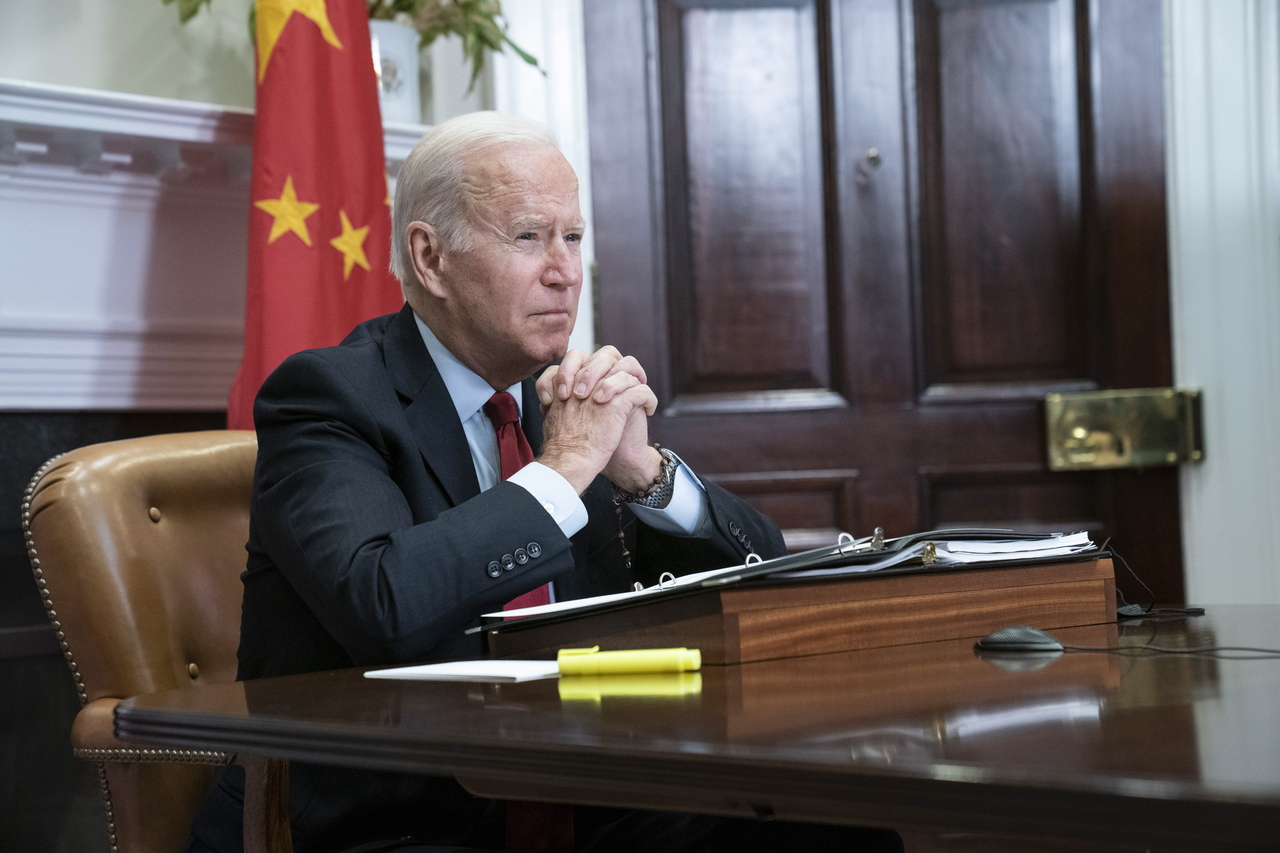Biden sparks fresh confusion over US policy towards Taiwan
Sign up now: Get ST's newsletters delivered to your inbox

It's not the first time US President Joe Biden's Taiwan comments have generated confusion.
PHOTO: EPA-EFE
Follow topic:
WASHINGTON/BEIJING (BLOOMBERG, XINHUA) - President Joe Biden reignited confusion about his administration's approach towards Taiwan hours after a lengthy virtual summit with Chinese President Xi Jinping, providing an early test of whether the countries can move past the issue after a generally positive meeting.
Speaking to reporters in New Hampshire on Tuesday (Nov 16), Mr Biden said Taiwan "makes its own decisions", and that the self-governing island is "independent".
Hours later, Mr Biden waded back into the issue, saying "we are not encouraging independence" and emphasising again that historic US policy towards the island democracy remains in place.
"We're not going to change our policy at all," Mr Biden told reporters. "We're encouraging them to do exactly what the Taiwan Act requires," he added, an apparent reference to the Taiwan Relations Act governing American policy.
"That's what we're doing. Let them make up their mind. Let them make up their minds, period - Taiwan."
Mr Biden's choice of words is likely to raise alarms in Beijing, which considers Taiwan part of its territory and has threatened to reclaim it if it seeks independence.
Mr Biden had earlier assured Mr Xi in their talks that he supports a one-China policy and is not changing US strategy, according to a White House statement.
The delicate diplomacy around US-Taiwan-China relations is similar to the fine-tuned choreography of Israeli-Palestinian ties.
But with the US and China, the world's two biggest economies are involved.
For decades, American policy has been guided by a set of diplomatic agreements including the 1979 Taiwan Relations Act and other accords that form the foundation for the US relationship with China.
As part of the US' one-China policy, Washington regards Beijing as the "sole legal government of China", without clarifying its position on Taiwan's sovereignty.
Supporting Taiwan's independence would contradict those agreements, even though US policy allows for weapons sales to the island to foster its self-defence.
Some on the political right have praised Mr Biden for being more direct about US support for Taiwan, but the back-and-forth comments have made it difficult to discern whether there is specific strategy at play or whether the controversy stems from miscommunication.
The president on Monday told Mr Xi that the US opposes any unilateral effort "to change the status quo or undermine peace and stability across the Taiwan Strait" - comments directed at China after it stepped up military flights into the island's air defence identification zone in recent months.
Mr Biden also reminded Mr Xi during the summit talks on Monday that he voted as a senator to support Taiwan's self-defence when the two discussed the island, National Security Adviser Jake Sullivan said on Tuesday.
"The two leaders spent a good amount of time on the question of Taiwan," Mr Sullivan said at a Brookings Institution event on Tuesday.
Chinese readouts of the leaders' meeting on Monday night said Mr Biden was opposed to Taiwan's independence and said Mr Xi warned that those playing with fire around Taiwan "would inevitably burn themselves".
Taiwan's foreign ministry accused Beijing of purposely mischaracterising Mr Biden's statements.
It was not the first time that Mr Biden's Taiwan comments have generated confusion. The president said in a CNN town hall last month that the US would defend Taiwan if the island's status quo was changed unilaterally, even though the US has deliberately never said whether it would use its military in case of Chinese attack.
Hours later, the White House said Mr Biden had only been reiterating a longstanding, and still unchanged, policy. It was not immediately clear how the president's comments would be received in Beijing.
On Wednesday, China voiced firm opposition to any form of "Taiwan independence" attempts through law amendment, saying that such moves by Taiwan's Democratic Progressive Party (DPP) are being closely watched.
Ms Zhu Fenglian, a spokesman for the State Council's Taiwan Affairs Office, made the remarks in response to a media query.
The DPP, despite the resolute opposition and stern warnings from various parties, persisted with such attempts, which would only boomerang in the end, Ms Zhu said.
She urged all responsible political parties and people with a vision on the Taiwan island to expose the DPP's plot and take concrete actions to safeguard peace across the Taiwan Strait and the wellbeing of people in Taiwan.
Ms Zhu also called on Taiwan compatriots to stay highly vigilant, consciously oppose and resist any attempt to seek "Taiwan independence" through law amendment, and avoid being hijacked by the DPP onto its chariot for "Taiwan independence".
US officials said the 3-1/2-hour discussion between Mr Biden and Mr Xi on Monday night was candid and respectful.
"It was a good meeting," Mr Biden said. "We've got a lot of follow-up on, we set up four groups, we're going to get our folks together on a whole range of issues. I'll have more to report to you in the next two weeks."
As anticipated, the conversation between Mr Biden and Mr Xi was mostly aimed at setting the rules of engagement between the world's two largest economies, in an effort to avoid unintended military conflict or economic damage.
The leaders also discussed how their countries "can work together to ensure global energy supply and price volatility do not imperil the global economic recovery", Mr Sullivan said. "The two presidents tasked their teams to coordinate on this issue expeditiously."

